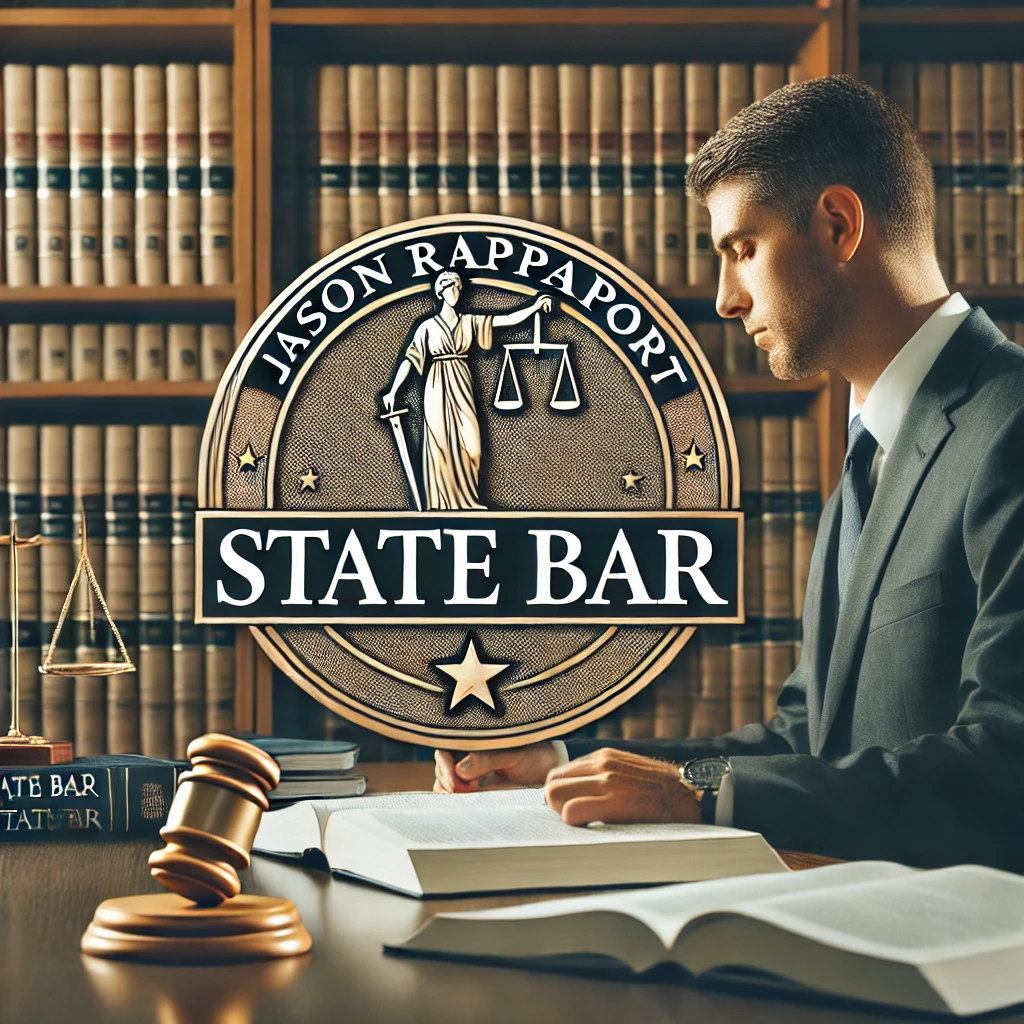Jason Rappaport State Bar: Key Roles & Responsibilities
Jason Rappaport is a name that has gained recognition within legal circles, particularly for his association with the State Bar. While there may not be as much publicly available information on Jason Rappaport State Bar, it is possible to explore the functions of the State Bar. The significance of individuals like Rappaport in the legal system, and how this shapes the experience of law practitioners and the community at large. This blog aims to break down the role of the State Bar. Also why people such as Jason Rappaport are integral to maintaining the integrity of the legal profession.
Understanding the State Bar
To begin, it’s important to understand what the State Bar is and what it does. The State Bar is a regulatory body that oversees the practice of law in a particular state or region. Its primary functions include:
- Licensing Lawyers – The State Bar is responsible for granting licenses to attorneys, allowing them to practice law. Attorneys must meet certain education and ethical standards, pass a rigorous exam (the Bar Exam), and often participate in continuing education throughout their careers.
- Regulating Legal Practice – Once attorneys are licensed, the State Bar oversees their conduct to ensure they follow ethical guidelines. If a lawyer violates these guidelines, the Bar can investigate and take disciplinary action.
- Jason Rappaport State Bar: Promoting Public Access to Justice – The State Bar also ensures that the public has access to legal services, particularly for those who may not afford them. It often provides resources and helps promote pro bono work (free legal services for those in need).
- Continuing Legal Education – The State Bar often mandates that attorneys continue their education through courses and seminars to stay updated on changes in the law and best practices.
Individuals like Jason Rappaport, often part of the State Bar leadership or key committees, help guide these functions, ensuring that the legal profession operates with integrity and efficiency. But why is this important?
Jason Rappaport State Bar: Why the State Bar Matters

The legal system is complex, and the decisions made by lawyers and judges affect people’s lives in profound ways. From criminal defense to property law, every legal decision has a real impact. That’s why the State Bar is essential. It ensures that those who practice law do so ethically, fairly, and with the necessary expertise.
One of the most important roles of the State Bar is to protect the public from unethical legal practices. The legal profession is one where trust is vital. If a lawyer breaches that trust, the consequences can be severe for their clients. The State Bar investigates complaints about attorneys and, if necessary, takes disciplinary action. This includes suspension or disbarment (removing a lawyer’s license to practice).
For people like Jason Rappaport, involvement with the State Bar. It means being part of a system that holds attorneys accountable and ensures public trust in the legal system. By upholding these standards, the State Bar preserves the legal profession’s reputation and ensures justice is served fairly and ethically.
How Jason Rappaport’s Work Impacts Lawyers
While there may not be much publicly available information on the specific work of Jason Rappaport. Individuals in similar roles at the State Bar are usually involved in:
- Policy Development – The State Bar develops and implements policies that affect how lawyers practice. This includes everything from new ethical guidelines to rules on attorney advertising. Rappaport’s role could include helping craft these policies, ensuring they are fair and effective.
- Disciplinary Actions – One of the most important functions of the State Bar is to investigate complaints against lawyers and take action when necessary. Jason Rappaport might review cases and help decide whether an attorney should face suspension or other disciplinary measures.
- Support for Lawyers – The State Bar doesn’t just regulate lawyers—it also supports them. This can include organizing training programs, providing mental health resources, and helping lawyers navigate the challenges of the profession.
Explore Also: Creative Excellence Team General Motors: Driving Innovation
Jason Rappaport State Bar: The Role of Leadership in the State Bar
For individuals like Jason Rappaport who hold leadership positions within the State Bar, there are even greater responsibilities. Leadership in the State Bar typically involves guiding the strategic direction of the organization and ensuring that the Bar continues to serve both the public and the legal profession.
One of the challenges faced by leaders in the State Bar is balancing the needs of attorneys with the responsibility to protect the public. Attorneys, like anyone else, may experience stress, burnout, or financial pressure. Leaders like Jason Rappaport may work to provide support systems for lawyers while ensuring that the public’s trust in the legal system remains intact.
Additionally, leaders in the State Bar often advocate for legal reform. They may push for changes in legislation or legal practice that benefit both the legal profession and the wider community. For example, they might work on policies that make legal services more accessible to underserved populations or that improve the quality of legal education.
Jason Rappaport State Bar: Challenges in the Legal Profession

The legal profession is not without its challenges, and the State Bar, with leaders like Jason Rappaport, often has to address these. Some of the most common challenges include:
- Access to Justice – While the State Bar works to promote access to legal services, there are still significant gaps in who can afford representation. Many people, particularly in lower-income communities, struggle to find affordable legal help. The State Bar has a responsibility to address these gaps, often by encouraging attorneys to take on pro bono cases or by supporting legal aid organizations.
- Jason Rappaport State Bar: Technological Changes – The legal profession, like many others, is being transformed by technology. From artificial intelligence (AI) that can assist in legal research to online platforms that offer legal advice, technology is changing how lawyers practice law. The State Bar must navigate these changes and ensure that attorneys are equipped to deal with new challenges, while also protecting the public from potentially unethical or misleading practices.
- Ethical Dilemmas – Lawyers often face ethical dilemmas in their work. Whether it’s balancing the needs of clients with the law, or dealing with conflicts of interest, lawyers must navigate complex situations. The State Bar provides guidelines and support to help attorneys make the right choices, but this is not always easy. Leaders like Jason Rappaport may be involved in refining ethical guidelines to address new challenges in the profession.
Jason Rappaport State Bar: Moving Forward
Looking ahead, the State Bar will continue to play a critical role in shaping the future of the legal profession. With increasing globalization, new technologies, and shifting societal values, the legal profession is evolving rapidly. The State Bar, with the help of individuals like Jason Rappaport, will need to adapt to these changes while maintaining its core mission of protecting the public and promoting ethical legal practice.
One of the key areas of focus for the future will be increasing diversity within the legal profession. Many state bars, including those where leaders like Jason Rappaport operate, are actively working to ensure that the legal profession reflects the diversity of the communities it serves. This includes initiatives to support underrepresented groups in entering the legal profession and providing resources to help them succeed.
Another focus area will be addressing mental health issues in the legal profession. Lawyers often face high levels of stress, long hours, and challenging cases. The State Bar is increasingly recognizing the importance of supporting lawyers’ mental health and providing resources to help them manage the pressures of the job.
Conclusion
Although specific details of Jason Rappaport’s involvement with the State Bar remain unclear, individuals like him play a critical role in maintaining the integrity of the legal profession. The State Bar licenses attorneys, ensures they act ethically and maintains their competence to serve the public. Leaders within the organization actively uphold these standards while supporting the legal community.
Through their work, people like Jason Rappaport help ensure that the public can trust the legal system and that justice is accessible to all. The State Bar faces many challenges, from addressing gaps in access to justice to navigating the rapidly changing landscape of legal technology, but with strong leadership, it will continue to serve as a vital institution for both the legal profession and society as a whole.
In the end, the work of the State Bar and its leaders ensures that the legal profession remains one that is fair, ethical, and dedicated to serving the public good. Whether by crafting new policies, overseeing disciplinary actions, or supporting lawyers in their practice, individuals like Jason Rappaport help to shape the future of the legal profession for the better.
FAQs:
What is the State Bar?
The State Bar is a regulatory body responsible for licensing and overseeing attorneys. It ensures they follow ethical guidelines and continue their legal education.
What does Jason Rappaport do for the State Bar?
While there’s limited public information on Jason Rappaport’s specific role. Individuals like him typically help shape policies, regulate attorneys, and support legal professionals within the State Bar.
Why is the State Bar important?
The State Bar protects the public by regulating attorneys. Through promoting ethical practices, and ensuring access to legal services for all, particularly underserved communities.
What is the process for disciplining lawyers?
The State Bar investigates complaints against lawyers. If violations of ethical guidelines are found, they may take actions such as suspension or disbarment.
How does the State Bar help lawyers?
In addition to regulation, the State Bar provides support through resources. Like continuing education programs, mental health services, and networking opportunities.
What are some challenges the State Bar faces?
Challenges include ensuring access to justice, adapting to technological advancements, promoting diversity in the profession, and addressing lawyer mental health.
How is the State Bar involved in legal education?
The State Bar often mandates continuing legal education for attorneys. Helping them stay updated on new laws, technologies, and ethical practices to maintain high standards in the profession.






